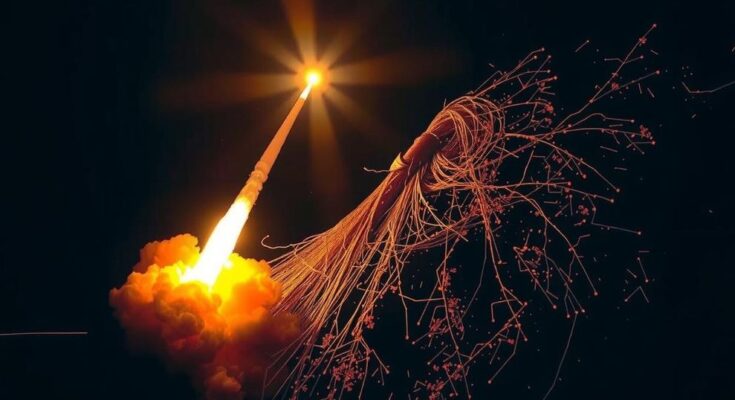On Thursday, a rocket attack from Lebanon killed at least seven people in northern Israel, coinciding with U.S. diplomatic efforts for cease-fires in the region. Hezbollah continues to engage in daily assaults against Israel, prompting IDF retaliatory strikes, including recent airstrikes in Syria. The ongoing conflict has resulted in substantial casualties and widespread evacuations. U.S. officials are negotiating proposals for cease-fires, but a resolution remains elusive due to entrenched positions from the warring factions.
On Thursday, a sequence of rocket strikes originating from Lebanon resulted in the deaths of at least seven individuals in northern Israel, marking the most lethal attack since the commencement of Israel’s recent military actions earlier this month. The assaults occurred at two distinct locations, coinciding with the presence of senior U.S. diplomats in the region advocating for cease-fires in Lebanon and Gaza amidst the ongoing conflicts involving Iranian-backed factions in the Middle East during the concluding months of the Biden administration. The militant group Hezbollah has been persistently launching rockets, drones, and missiles into Israel on a daily basis, prompting retaliatory airstrikes after Hamas initiated its terrorist offensive on October 7, 2023, from the Gaza Strip, which ignited the ongoing conflict there. Both Hezbollah and Hamas are recognized as ideological allies, often classified as Iranian proxy organizations, and have been designated as terrorist entities by the United States, Israel, and numerous additional nations. In response to the attacks, the Israel Defense Forces (IDF) reported conducting airstrikes targeting sites in Qusair, a Syrian city located near the Lebanese border, where they alleged Hezbollah had commenced storing armaments for smuggling into Lebanon. Previous IDF operations have frequently targeted border crossings between Lebanon and Syria, asserting that these routes facilitate the trafficking of weapons. As reported by Syrian news sources, at least five individuals lost their lives during Thursday’s airstrikes. The escalation of conflict along Israel’s northern border reached a peak last month when the IDF executed extensive airstrikes across Lebanon, resulting in the death of Hezbollah’s senior leader, Hassan Nasrallah, alongside most of his commanders. Following these engagements, Israeli ground troops initiated operations in Lebanon at the beginning of October, with reports indicating that approximately two dozen Israeli personnel have been killed since. Lebanese health authorities estimate that the ongoing airstrikes have claimed around 2,000 lives throughout Lebanon. The Metula regional council in northern Israel cited Thursday’s rocket assault, which claimed the lives of five individuals, without specifying the types of projectiles utilized. The identity of the four foreign workers who perished during this incident remains unknown. Located at the northernmost point of Israel and surrounded by Lebanese territory, Metula has endured significant destruction due to rocket fire. The town’s residents have largely evacuated since October 2023, leaving only security personnel and agricultural workers behind. The Hotline for Refugees and Migrants, advocating for foreign laborers, criticized authorities for placing them at risk by permitting work along the border without sufficient protective measures. Agricultural zones located along Israel’s border, which host a majority of the nation’s orchards, have been designated as closed military areas requiring official authorization for access. Following the initial rocket strike, Magen David Adom, Israel’s principal emergency medical organization, announced that medics had confirmed the deaths of a 30-year-old male and a 60-year-old female in a northern suburb of Haifa. Additionally, they treated two individuals for minor injuries, who were subsequently hospitalized. The Israeli military indicated that approximately 25 rockets were launched from Lebanon as part of this barrage, impacting an olive grove where individuals had congregated for the harvest. In a video statement on Wednesday, Hezbollah’s newly appointed leader, Sheikh Naim Qassem, declared that the group would persist in its military operations against Israel until acceptable cease-fire terms are presented. He asserted the group’s resilience, saying, “Hezbollah’s capabilities are still available and compatible with a long war.” On the morning of Thursday, during renewed military actions, the Israeli military warned residents to evacuate further areas within southern Lebanon, where airstrikes in various regions reportedly resulted in eight fatalities according to the Lebanese National News Agency. The Israeli government has urged evacuations across substantial portions of the country, including major urban centers in the south and east. Since the onset of conflict over a year ago, official Lebanese accounts indicate that more than 2,800 individuals have died and nearly 13,000 have sustained injuries, alongside approximately 1.2 million people displaced from their homes. Within Israel, missiles, rockets, and drones launched by Hezbollah have led to the deaths of at least 68 individuals, about half of whom are soldiers. Furthermore, over 60,000 residents from border communities have evacuated their homes for an extended duration. The United States, alongside other involved nations, has circulated new proposals aimed at de-escalating the ongoing regional conflicts as the Biden administration nears its conclusion. Negotiations regarding both fronts remain stalled, with none of the parties displaying any inclination to concede on their demands. Senior White House officials Brett McGurk and Amos Hochstein returned to Israel on Thursday to engage in discussions about potential cease-fires and the release of hostages held by Hamas. CIA Director Bill Burns was en route to Egypt for talks concerning these initiatives. Prime Minister Benjamin Netanyahu met with McGurk and Hochstein, where his office documented that the Israeli leader expressed gratitude for the American diplomatic efforts while emphasizing that the core issue extends beyond mere documentation of agreements—it strictly pertains to Israel’s resolve to actualize agreements and neutralize any security threats from Lebanon. Among the proposals currently under discussion for halting the hostilities between Israel and Hezbollah is a two-month cease-fire which would entail the withdrawal of Israeli forces from Lebanon, while Hezbollah would need to cease its armed presence along the southern border. However, Israel exhibits skepticism regarding the reliability of UN peacekeepers and Lebanese military personnel—entities it accuses of enabling Hezbollah’s entrenched presence over the past decade—to uphold a newly established buffer zone. Israel insists on the right to engage in military actions against the militants when necessary, while Lebanese authorities demand complete withdrawal. Conversely, separate negotiations involving the U.S., Egypt, and Qatar suggest a four-week cease-fire in Gaza, during which Hamas would be expected to release up to 10 hostages. However, Hamas appears reluctant to agree to release numerous captives without first achieving a more durable cease-fire and receiving assurances of a total Israeli exit from Gaza, despite the removal of its prominent leader, Yahya Sinwar. Prime Minister Netanyahu has maintained that enduring Israeli administration over portions of the territory remains imperative.
The ongoing conflict between Israel and Iran-backed military groups is characterized by significant violence and geopolitical tensions in the Middle East. Hezbollah, positioned in Lebanon, has increasingly participated in hostilities against Israel, particularly following the recent conflict that erupted after Hamas’s attack on October 7, 2023. The war has extended beyond Gaza, involving extensive military engagements along Israel’s northern border with Lebanon and escalating threats to both civilian and military personnel. The involvement of U.S. diplomats highlights international efforts to mediate and propose cease-fires amidst rising fatalities and displacements in both Israel and Lebanon. The conflicts emphasize the long-standing geopolitical dynamics involving Iran’s influence in the region, which supports both Hezbollah and Hamas as proxy forces. As the Biden administration’s tenure nears its conclusion, diplomatic negotiations appear increasingly critical. However, deep-seated distrust and conflicting demands among the parties hinder progress towards an enduring resolution. The humanitarian fallout from the conflict has escalated, with thousands killed and millions displaced, further complicating efforts for peace in the region. Reports continue to document the severe impact on civilian life, necessitating urgent humanitarian interventions and comprehensive strategies to avert further escalation of violence.
The recent rocket attacks from Lebanon into northern Israel have resulted in the deaths of several individuals, escalating an already severe conflict involving Israel and Iranian-backed groups such as Hezbollah and Hamas. As diplomatic efforts spearheaded by U.S. officials seek to establish cease-fires, the situation remains volatile, with ongoing military actions and heightened tensions. The humanitarian consequences of the fighting have been profound, with significant casualties and displacement reported across both Israel and Lebanon. As various proposals for cease-fires are deliberated, the potential for achieving lasting peace remains uncertain amidst deep-seated mistrust and conflicting demands from the parties involved.
Original Source: www.cbsnews.com




